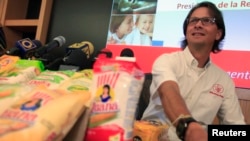President Nicolas Maduro has called for the prosecution of Venezuela's biggest businessman for allegedly conspiring against his government in a phone call discussing a possible international bailout for the crisis-stricken, oil-dependent economy
Maduro late Sunday accused billionaire businessman Lorenzo Mendoza, president of the Empresas Polar food and beer conglomerate, of waging an "economic war" against Venezuela with the aim of surrendering control of the country to the International Monetary Fund.
The sharp rebuke was in response to a phone conversation aired on state TV last week between Mendoza and outspoken government critic Ricardo Hausmann, a Harvard University economist who suggested Venezuela needs a $40 billion IMF bailout to stem a deep crisis marked by triple-digit inflation, widespread shortages and an estimated 10 percent shrinking of the economy this year.
"The biggest of bigwigs thinks he has power that he doesn't have," Maduro said in the call, employing a jab frequently used to mock his opponents among Venezuela's business class.
"It's a crime what he's done and what he's doing, speaking in the name of the fatherland," said Maduro. "He should be prosecuted. I hope the judicial bodies react."
Mendoza hasn't responded to Maduro's remarks. But in a statement last week, he accused the government of violating his privacy by illegally recording and then broadcasting a personal conversation. He said he's deeply concerned about the march of the economy, which has already led to work stoppages at several Polar-owned facilities, and regularly converses with economists across the political spectrum.
Polar is the nation's largest food supplier and a favorite target of Maduro and his predecessor Hugo Chavez, who have accused businesses of trying to sabotage the economy by hoarding goods sold at state-mandated prices and handing them over to criminals who smuggle them across the border, where they can fetch a huge premium.
Most Venezuelans don't appear to accept that explanation for the country's economic problems, with polls showing opposition candidates heavily favored to win December congressional elections.




